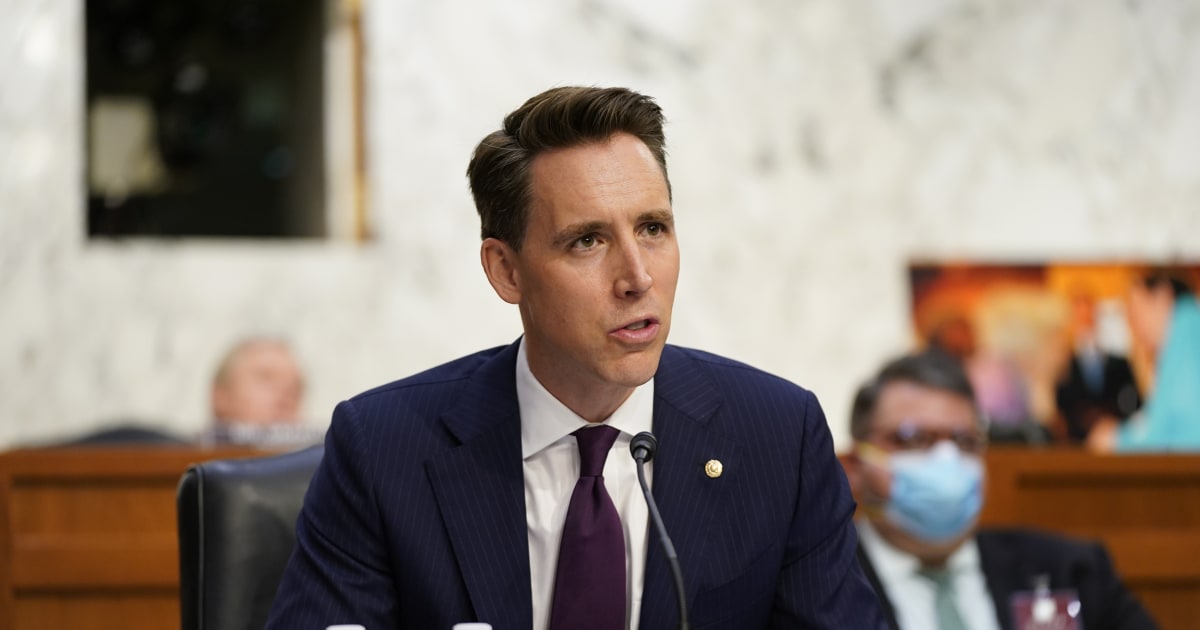Senator Josh Hawley, R-Mo., Announced on Wednesday that he would oppose certification of the results of the Electoral College of some states on January 6, a move that will force his Republican colleagues to vote to choose between rejecting the groundless allegations of the President Donald Trump of mass electoral fraud in this year’s election or disenfranchisement of millions of voters.
While several Republican members of the House are expected to oppose the results of the Electoral College of several key states during the certification of congressional votes next week, Hawley is the first senator to commit to doing so. The announcement is significant because, according to Congress rules, a written objection that is endorsed by a member of the House and a senator is required to force Congress to consider an objection.
It is highly unlikely that the objections will succeed. For one to be supported and a state’s presidential vote rejected, the majority in each chamber must vote to agree with the objection. Democrats hold a majority in the House, and although Republicans have a small majority in the Senate, several moderate Republicans have said they would not vote to withdraw votes from a state.
Senate majority leader Mitch McConnell, R-Ky., Asked in particular Republican senators not to challenge the vote because it could put some vulnerable Republicans in conflict with Trump’s fervent supporters.
House Speaker Nancy Pelosi, D-Calif., Ignored Hawley’s announcement, telling reporters that she “has no doubt that next Wednesday, a week from today, that Joe Biden will be confirmed by acceptance of the Electoral College vote as the 46th President of the United States. “
Biden’s new press secretary at the White House, Jen Psaki, also showed no concern during a virtual meeting with reporters.
“Congress will certify the results of this election as it does every four years,” said Psaki, adding: “This is just a formality. It must certainly be treated as such. “
Despite the remote nature of the challenge, Hawley’s objection could lead to a long day; Congress can debate for up to two hours over objections to each state’s results before members vote.
Hawley, who is considered a possible presidential candidate in 2024, did not say how many states he would object to, but suggested that Pennsylvania would be one of them.
“I cannot vote to certify the results of the Electoral College on January 6 without raising the fact that some states, particularly Pennsylvania, have not followed their own state electoral laws,” Hawley said in a statement, echoing a statement made repeatedly by the president and repeatedly rejected by state and federal courts.
Pennsylvania Attorney General Josh Shapiro criticized Hawley’s announcement as “another unfounded attempt by Trump’s facilitators to undermine the will of the people.”
“The Pennsylvania election was safe, legal and fair. Our electoral votes were cast for Joe Biden and Kamala Harris,” he wrote in a couple of tweets, adding that “people should know that any senator who makes statements about challenging the Pennsylvania election result is playing a political theater for Donald Trump, not following any facts or laws.”
In his statement, Hawley tried to portray the extraordinary movement as normal, saying, “I will follow the same practice that Democratic members of Congress followed in previous years,” pointing to the 2004 and 2016 elections.
During the 2016 election results certification, several House Democrats tried to oppose the vote in several states, but were rejected by then Vice President Biden, who noted that no senator adhered to his objections.
After the 2004 election, then Sen. Barbara Boxer, D-Calif. and Congresswoman Stephanie Tubbs Jones, D-Ohio, objected to Ohio’s votes, claiming voter suppression because of long lines and a lack of electronic voting machines in minority areas in the state.
Then-rep. Candice Miller, R-Mich., Said these complaints were “outrage based on fantasy conspiracies”, while Bush White House press secretary Scott McClellan said, “It’s time to move forward and not get involved in theories conspiracy or party politics of that nature. ”
The measure failed in the Senate by a 74-1 vote and in the House by a 267-31 vote.
Senator Chris Murphy, D-Conn., Took a bleak view of Hawley’s actions in an interview with Andrea Mitchell of MSNBC.
“Josh Hawley and everyone who supports his effort is committed to trying to overthrow democracy,” said Murphy. “There is no evidence that there has been any fraud. Senator Hawley apparently believes that if a Democrat wins the presidential race, he must be illegitimate by definition, even in the absence of any real evidence of bad behavior. “
Last week, Senator John Thune of South Dakota, the second Republican in the Senate, warned his Republican colleagues against making objections on January 6.
“I think what they need to remember is that it is not going anywhere. I mean, in the Senate, it would fall like a gunshot,” Thune told reporters. “I just don’t think it makes much sense to put everyone in this situation when you know what the end result will be,” he added.
Trump responded to him shortly after on twitter, mocking Thune as a “RINO” – an acronym for Republican in name only – and suggesting that he “should just let that happen. South Dakota doesn’t like weaknesses. He will have primacy in 2022, political career over !!! “

